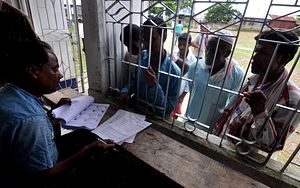Foreign journalists are still awaiting permission from the Indian government to visit Assam in the country’s northeastern region following restrictions imposed three months ago.
In response to a query under the Right to Information Act, the Ministry of External Affairs (MEA) said that the applications of seven journalists who had applied for visas to visit Assam are now being examined by a “concerned” department of the government.
Information, however, was “not available” with the ministry on another query which asked for details about the countries the journalists belonged to and the media houses they were engaged with.
Unlike some other hill states in the country’s Northeast, no permission is required either by Indian citizens or foreign nationals to visit Assam. But last September, a notification of the MEA mentioned that foreign journalists desiring to visit a restricted or protected area, including Jammu & Kashmir or the northeastern states, should apply for a special permit through the ministry.
The spokesperson for the Ministry of Home Affairs had also tweeted the following on the matter: “Any foreign journalist, whether already based in India or not, can visit Assam after taking permission of MEA. MHA is consulted internally by MEA before issuing this permission. There is no PAP or RAP area in the state of Assam. Thus no PAP or RAP is needed by a foreign journalist.”
The state governments of the concerned regions have also been instructed to forward all applications for special permits to the central ministries.
In July, the MEA had circulated a notification issued by the Ministry of Home Affairs among all foreign journalists in India which mentioned Manipur, Mizoram, Arunachal Pradesh, Nagaland, and Sikkim in the Northeast as protected areas. The restricted areas included the union territories of the Andaman and Nicobar Islands and parts of Sikkim. Assam was not included in any of these categories.
A government official said that the new rule was prompted by the spate of “false and biased reports” by a section of the foreign media on the National Register of Citizens (NRC) and the foreigners issue in Assam. The NRC, which has been updated only in Assam among all the states in the country, was completed on August 31, leaving out nearly two million people from the list.
He referred to a report published in The Times on August 29 captioned “No papers, no rights: how Modi plans to oust millions of ‘foreigners’ who have lived in India all their lives,” which, among other reports, triggered the government’s decision for the new rule.
The report mentioned that a detention center that was being built at Goalpara for convicted foreign nationals was “hidden from the eyes of the world” and “shrouded in secrecy.” However, reports about the center had been published since last year, giving details about its capacity and location.
The government is also reportedly peeved over reports that portrayed the exercise as being biased against the Muslims. The NRC was mentioned in the tripartite accord of 2005 between the government and the All Assam Students’ Union (AASU) but it was updated under the supervision of the Supreme Court after its judgment on a Public Interest Litigation filed by Assam Public Works four years later.
Incidentally, almost two-thirds of the two million people whose names were left out of the register are believed to be Bangladeshi Hindus who landed in Assam after the cut-off date of March 24, 1971, for inclusion in the NRC. This is also a primary reason that has compelled efforts by the ruling BJP to table the controversial Citizenship (Amendment) Bill in Parliament, which seeks to grant citizenship to a section of non-Muslims from Afghanistan, Pakistan, and Bangladesh.
This is not the first time that the Indian government has clamped restrictions on foreign media journalists. Early in 2017, BBC and its correspondent Justin Rowlatt were banned for five years from entering any tiger reserve in the country.
Rowlatt’s documentary titled One World: Killing for Conservation on rhino conservation in Kaziranga drew a sharp reaction from the Ministry of Environment and Forest, which it termed as “grossly erroneous.” The documentary said that the authority in Kaziranga, which also happens to be a tiger reserve and a World Heritage Site, had empowered guards to shoot anybody they thought was a threat to the rhinos.
Rajeev Bhattacharyya is a senior journalist in Assam, India.

































